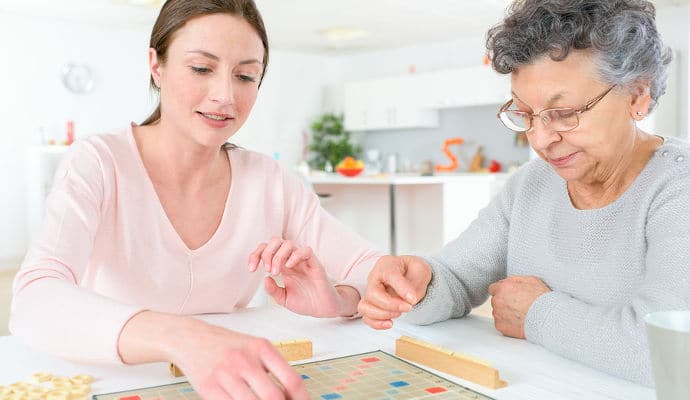01
Nov 2022
6 Cognitive Activities for Your Elderly Loved Ones
Published in Tips on November 01, 2022

Do you notice any mental decline in your elderly parents or loved ones? Do you want to assist them in regaining their mental faculties?
If so, encouraging a few cognitive activities can be a great way to help them enrich their minds.
Cognitive activities are important for seniors to maintain their mental sharpness and prevent cognitive decline. There are many different ways to keep the mind active, from doing puzzles to learning new skills.
If you're looking for ways to give back to your loved ones, here are six cognitive activities that your elderly loved ones can do to stay mentally sharp.
1) Sewing and Embroidery
An excellent way to keep your elderly loved one's mind active is by encouraging them to sew and knit different fabrics.
Sewing and embroidery are not only creative outlets, but they can also help improve dexterity, fine motor skills, and visual-spatial awareness. This activates various processes in the brain, which further strengthens their problem-solving skills and general cognitive abilities.
For some elderly folks, sewing can even be seen as a meditative and stress-relieving activity. The repetitive motion of sewing can help the mind feel both concentrated and relaxed at the same time. Sewing also requires people to follow a specific set of instructions, which requires a clear and sound mind.
Additionally, the combination of the body's movement and the brain's signaling helps prevent the brain from becoming overly sedentary.
2) Reading and Writing
Reading is one of the most effective ways to keep the mind active and challenged.
As we age, it's essential to keep our brains engaged in activities that promote critical thinking and analysis. Reading does just that—it helps improve one's comprehension skills, vocabulary, and overall knowledge.
Additionally, reading can also help stave off the delayed onset of dementia and Alzheimer's disease. This is large because it's an activity that requires the brain to be active and focused.
That said, reading becomes increasingly difficult as we age.
If your loved one's eyesight has deteriorated over time, you may give them a better set of glasses or allow them to read with an e-reader device. You may also increase the font size to help those with vision and dexterity problems.
3) Playing Word Games
You may have seen your grandparents play word games on their phones or crossword puzzles in their free time. These are classic examples of cognitive activities that can help improve your loved one's mental faculties.
Word games are excellent exercises to boost cognitive abilities in the elderly. They help improve memory, vocabulary, and problem-solving skills. They also often require people to think under a time limit and critically, which can help prevent cognitive decline.
Some great examples of word games include Scrabble, Boggle, and Crosswords. These games can be played online or in person, depending on your loved one's preference. Some word games can even be played among family and friends, which can help keep your elderly loved one socially active as well.
4) Doing Jigsaw Puzzles
Jigsaw puzzles are a great way to keep both sides of the brain active.
This activity helps improve problem-solving skills, logic, and hand-eye coordination. It also allows people to exercise their patience, as they have to wrack their brains to fit certain jigsaw pieces together.
Jigsaw puzzles come in different levels of difficulty, making it a great way for elderly people of all ages to gradually challenge the mind. For instance, you can start with puzzles that have fewer pieces and work your way up to more complex ones.
You can also try different variations of jigsaw puzzles, such as 3D puzzles or ones with different shapes. These can help add an extra layer of difficulty and keep things interesting for your loved one.
5) Playing Sudoku
Sudoku is another excellent brain teaser for the elderly.
This number-placement puzzle requires people to use logic and reasoning to solve it.
It's a great way to improve problem-solving skills, critical thinking, and concentration. And instead of using visual cues or letters as a way to solve the puzzle, Sudoku uses numerical patterns – making it a great activity for those who want to solely use their logical thinking brain.
Similar to jigsaw puzzles, Sudoku puzzles come in different levels of difficulty. You can start your elderly loved one off with an easy puzzle and work your way up as they get better at it.
6) Socializing and Volunteering
When you grow older, it gets harder to maintain friendships and relationships. If your loved one spends the majority of their day holed up in their room, make sure that you set aside some time for them to maintain social interactions with people they care about.
Socialization and volunteering are two great activities that can help elderly people stay mentally sharp. They promote brain health by giving the elderly a sense of belonging and purpose.
Additionally, they can help stave off depression and loneliness, which are two major contributors to rapid cognitive decline. If your elderly loved one is able, allow them to spend some time with friends and acquaintances.
You may even consider placing them at a facility for aged care in Melbourne where they can interact with other elderly folk and trained nurses that can assist them..





